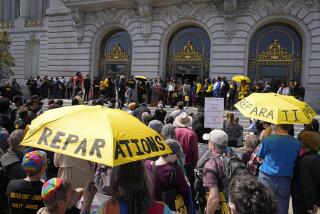Forced Nazi Labor Reparations Debated
- Share via
WASHINGTON — The State Department played host Wednesday to a large international gathering of government, business and private groups trying to agree on reparations for hundreds of thousands of people forced by the Nazis to work as laborers during World War II.
Many were employed by large German companies, 15 of which have pledged to set up a fund by September to pay the reparations.
Presiding at the conference were Stuart Eizenstat, U.S. undersecretary of State for economic affairs, and Bodo Hombach, chief of staff for German Chancellor Gerhard Schroeder.
Delegations from Belarus, Ukraine, the Czech Republic, Israel, Poland and Russia were present. Also attending were representatives from reconciliation foundations from the Central and Eastern European countries, and officers from key German companies and their lawyers. Also represented was the Conference on Jewish Material Claims and attorneys representing Holocaust survivors in class-action suits.
Eizenstat told a news conference that agreement was reached to set up two working groups, one to set eligibility rules for payments from the fund and the other to deal with ways to ensure legal closure for the German companies. (It was announced Wednesday that Eizenstat will be nominated as deputy Treasury secretary.)
He said participants are committed to meeting in working groups in Washington and in Bonn and to making recommendations within the next 90 days.
He expressed hope that processes can be agreed to by Sept. 1. That date, he noted, is the 60th anniversary of the start of World War II.
Among the issues to be settled, he said, are ways to achieve legal closure, who should be the beneficiaries and how the fund would be operated.
The process will deal with the 70,000 to 90,000 people who are classified as slave laborers, mostly Jewish concentration camp or ghetto survivors, and so-called forced laborers, a much larger category that consists mostly of agricultural workers.
Eizenstat said the goal of the initiative is to provide victims with payments through a “cooperative, fair and nonbureaucratic arrangement without regard to nationality.”
More to Read
Sign up for Essential California
The most important California stories and recommendations in your inbox every morning.
You may occasionally receive promotional content from the Los Angeles Times.










